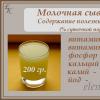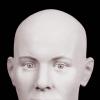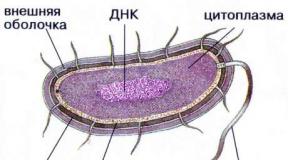Stress and stressful conditions. Causes, stages, what happens in the body, positive and negative consequences, methods of combating and increasing stress resistance. The human body's reaction to stress The human reaction to stress
Stress is a psychophysical reaction to cognitive, emotional and social tasks that the subject perceives as excessive.
Let's look at the characteristics of this phenomenon and, in particular, possible treatments (medicinal and natural).
What is stress
Stress is a state of mental and physical pathology characterized by anxiety and preoccupation, and the subject is unable to complete a task or resolve a situation.
The term “stress” is currently much and often abused. But what do mental health experts say about this?
V.B. Cannon (1871-1945) was the first scientist to study stress. He argued that all living beings (people and animals) in a dangerous situation react with changes of a predominantly physiological nature, in particular, an increase in blood pressure and dilation of the pupil. These reactions, according to the author, are aimed at restoring a state of disturbed psychophysical balance.
But K. Sale was the first to coin the term “stress” in 1936. According to Sale, a person experiences a state of stress when faced with the need to perform a large volume of tasks.
These could be tasks:
- cognitive(for example, finish work or study)
- emotional(eg major decisions, life losses or loss)
- social(for example, public speaking)
In other words, it is an imbalance between the energy required to perform a task and the subject's perception of himself: if the subject believes that he can and knows how to correctly perform such a task, this does not cause any stress reaction in him; in case the subject feels that he does not know and cannot (because, for example, he has little time or lacks some resources) to perform such a task, then a state of stress arises
What are the symptoms of pathological stress?
Stress is a psychophysical reaction and thus manifests itself through psychological and somatic symptoms.
From a psychological point of view we can distinguish cognitive symptoms, like for example:
- hard to concentrate
- difficulties with attention and memory
- lack of desire to act
- negative and pessimistic thoughts
- fear of failure
Emotional symptoms:
- frequent tears or the urge to cry
- nervousness
- anxiety
- feeling of loneliness
- feeling of powerlessness
- sadness and grief
Behavioral symptoms:
- excitation
- tendency to not complete tasks
- use of alcohol and/or drugs
- problems at work or school
- tendency to criticize others
- lack of appetite or excessive appetite, respectively, weight loss or gain
From a somatic point of view, stress is characterized by:
- headache
- nausea
- pain in muscles, limbs and back
- excessive sweating
- feeling constantly tired
Depending on the duration of stress, other characteristic symptoms may be detected.
Without going too far, it should be said that stress is divided into acute and chronic:
- acute stress characterized by an immediate reaction to a sudden and unexpected danger, such as an earthquake, natural disaster, illness, dismissal, etc.
- chronic stress refers to a longer-term state - a month or year, during which the subject is constantly exposed to the pressure of the situation.
In a state of chronic stress, other pathological conditions may also arise in addition to the usual symptoms listed above.
Consequences of psychological stress
If the state of stress is prolonged, important consequences may occur over time, such as:
- immune system disorders, such as frequent fevers or infections due to changes related to the functioning of the hypothalamic-pituitary-adrenal axis;
- dermatological disorders, such as itching, hair loss or premature graying of hair, brittle nails associated with a weakened immune system;
- metabolic disorders, such as high cholesterol, high blood sugar, digestive difficulties, intestinal problems, gastritis, ulcers, liver dysfunction, bloating caused by an increase in free radicals;
- cardiovascular diseases as an increased risk of heart attack due to arterial hypertension associated with changes in the functioning of the hypothalamic-pituitary-adrenal system;
- other violations, such as dizziness, menstrual irregularities in women, difficulties conceiving a child, overeating.
Causes of stress
Based on the definition of stress given above, it is difficult to accurately determine causes of stress. Cleaning the house may be stressful for some subjects, while others will feel at ease in the trenches of war.
However, we can say that there are situations that most often lead to stress:
- working (or studying) conditions;
- unusual negative life events;
- events in life, overcoming which require certain efforts and consistency;
- life events, such as wedding preparations, the birth of a child, change of residence.
Treating Stress – How to Feel Better
For a long time, the only treatment for stress was drug therapy, it is still in use today. In particular, in conditions of acute or chronic stress, psychiatrists and neurologists prescribe antidepressants and anxiolytics.
Indeed, as mentioned above, symptoms of stress are in one way or another associated with anxiety and depression, therefore antidepressants And tranquilizers have a significant impact on stressful situations. These drugs essentially restore normal level cortisol in the blood and normal neuronal function.
However, medications can have additional, unnecessary effects and interfere with the functioning of the body at the biological level. This is why another important treatment for stress is psychotherapy And psychological support: a series of sessions with a psychotherapist or psychologist.
There are different types of psychotherapy, the most commonly used:
- cognitive behavioral therapy. These techniques focus on the thoughts and behaviors that the subject habitually lives in and eliminating and/or reducing those negative thoughts;
- systemic therapy. This approach involves the involvement of the patient's family so that it is possible to know and influence environment, which, as a rule, leads to mental disorder.
Which therapy should I choose? Psychological or pharmacological? In severe cases, the doctor may prescribe both types of treatment; in all other cases, psychological therapy may be sufficient and less harmful than drug therapy.
Natural Remedies for Stress
According to alternative medicine, they most effectively help with stress supplements, including, in particular, magnesium and mineral salts. They are very useful for combating and preventing nervousness, mood swings and feelings of fatigue.
Nowadays, the word “stress” is heard constantly. The expressions “I’m stressed”, “I live in constant stress” are perceived as a kind of badge of honor, evidence of a busy business life. However, stress should not be taken lightly. Together with the author of the book “The Immune System Restoration Program,” let's look at the negative impact of stressful situations on our body.
What is stress
Stress is defined as the body's reaction to so-called stress factors. They can be emotional or physical. Severe stressful events include the death of a loved one, divorce or breakup, or physical or emotional abuse or trauma. Less obvious stress factors include lack of sleep, malnutrition, long hours of strenuous work, excessive exercise, and caring too much about others at the expense of oneself. Positively colored events, such as a wedding, getting a dream job, or moving to another city, can also become stress factors.
There are people who are very susceptible to stress, immediately noticing both its physical consequences (for example, stomach pain, headaches or rapid heartbeat) and emotional ones (irritability, fatigue, cravings for sweet or salty foods). But I often meet other people with a light, cheerful disposition, happy with life, who do not even suspect that their body may be suffering or that the physical symptoms they feel are nothing more than a consequence of stress. In fact, many people become so accustomed to living in a state of constant stress that they simply don’t notice it. And for others it is simply necessary to feel like a successful person. However, despite the variety of nuances, all stress factors trigger a cascade of processes in the body, which is called the stress response.
To understand what stress is, you need to understand one important thing: our body has developed two main mechanisms to respond to stress. The first is the reaction of the nervous system, the second is the activation of hormones, the most important of which, cortisol and adrenaline, are produced by the adrenal glands.
Nervous system response to stress
To understand how nervous system reacts to stress, let's get a few things clear. The human brain and spinal cord constitute the central nervous system. The remaining nerves form the peripheral nervous system, which is divided into two parts - somatic and autonomic. The nerves of the somatic nervous system are connected to the muscles, this part is easily controlled by conscious mental effort. For example, this is how we move our arm, raise our leg, or look to the right or left. The autonomic nervous system controls body functions that are considered automatic, such as heart rate, body temperature, blood pressure, respiratory rate, digestion, and others.
How our body works largely depends on the vegetative system. It has two components that balance each other and act as a switch. One of them, the sympathetic nervous system, turns on when we are under stress. This is one of the mechanisms of the stress response. The second component is the parasympathetic nervous system - a kind of switch, it acts as a brake, helping us relax and turn off the stress response.

The autonomic nervous system is a system with a rigidly programmed sequence of actions. This means that the stress response is triggered in the brain, and the signal then travels through all the nerves, stimulating various organs, including the stomach, heart, adrenal glands and lymphoid organs, where all T cells mature and develop. This programmed built-in immune system is of great importance for the functioning of T cells.
When we experience stress, our sympathetic system triggers what is called the “fight or flight” response. Its first manifestation is an increase in heart rate. This is due to two reasons. Firstly, the sympathetic nervous system stimulates the heart directly, and secondly, the adrenal glands release the hormone adrenaline, which also increases the heart rate. But our body also has an antidote to this: the parasympathetic nervous system comes into play, which should turn off the fight or flight response and thereby help us return to a state of balance so that we do not remain overloaded for long.
The hormonal system's response to stress
The second mechanism of response to stress is the launch of a chain of hormonal reactions in the brain. The chain reaction begins in the hypothalamus and pituitary gland, areas of the brain that regulate the hormonal system. They are located nearby and are closely related to each other. These areas are often seen as the place where our emotions, thoughts and feelings are converted into hormonal signals. The pituitary gland can be imagined as the conductor of an orchestra consisting of endocrine glands. It secretes hormones, which in turn stimulate all endocrine glands, including the thyroid, adrenal glands and ovaries or testes, to produce their own hormones. When the stress response is triggered, the hypothalamus begins to secrete corticotropin-releasing hormone (CRH), then the pituitary gland secretes the hormone adrenocorticotropin. This causes the adrenal glands to secrete the main stress hormone, cortisol.

Of the several stress hormones, cortisol is the most powerful and has multiple effects on the body. Severe and sudden stress causes cortisol levels to rise. Cortisol causes blood sugar levels to rise to provide energy for the fight-or-flight response. It is a major anti-inflammatory hormone that suppresses cells of the immune system and prepares the body for possible damage. In the event of injury, inflammation caused by immune system cells can impede the healing process. Therefore, by suppressing the immune system, cortisol helps prevent it from becoming overactive and producing molecules that damage tissue that needs to be repaired.
Manifestations of the stress response
Understanding these two stress responses (the sympathetic nervous system fight-or-flight response and the cortisol response) is important because they directly affect the immune system. But first, let's talk about what the stress response feels like.

The reaction to a stressful situation can be acute, but it can also last long after the situation has resolved. For example: If you've had conflicts with a friend or partner, or were caring for a seriously ill relative, you may have had trouble falling asleep at night due to worry or worry, felt muscle tension causing back or neck pain, or had a racing heart. There may be headache tension or other types of headaches, stomach pain and irritable bowel syndrome, expressed in diarrhea and/or constipation. Symptoms such as dry eyes, dry mouth, and cold hands or feet may also occur. If these feelings persist for too long, you may find that you start to get sick frequently. There was a malfunction in the immune system.
EFFECTS OF HIGH CORTISOL LEVELS
1. Increased appetite and food cravings.
2. Increased body fat.
3. Decrease in muscle mass.
4. Decreased bone density.
5. Increased anxiety.
6. Increased depression.
7. Mood swings (anger and irritability).
8. Decreased sex drive.
9. Disturbances in the functioning of the immune system.
10. Impaired memory and learning ability.
11. Gain PMS symptoms such as fluid retention and irritability.
12. Changes in the menstrual cycle.
13. Increased menopausal symptoms such as hot flashes and night sweats.
One of the most typical symptoms is constantly higher level cortisol - increase in waist size. Studies have shown that when people are stressed, they experience irresistible cravings for sweet and fatty foods. These foods stimulate the production of insulin, a hormone that lowers blood sugar levels. The combination of high concentrations of insulin and cortisol causes fat to be deposited around the internal organs, which leads to abdominal obesity. Not only does it make it difficult to button your pants, belly fat, or “brown fat,” looks and behaves differently than other fatty tissue in the body—it causes multiple pockets of inflammation. And inflammation is a typical root cause of all autoimmune diseases and other diseases such as heart disease, stroke, diabetes and cancer.
The book will tell you how to protect yourself from the negative consequences of stress and improve your health.
Ecology of consciousness. Psychology: Many of us would benefit from learning about effective methods, with the help of which we can cope with the consequences of emotional stress and tension, restore harmony and balance to our physical, emotional and mental well-being, and feel full of strength and energy.
It will be useful for many of us to learn about effective techniques with which we can cope with the consequences of emotional stress and tension, restore harmony and balance to our physical, emotional and mental well-being, and feel full of strength and energy.
Sometimes we suffer from the effects of accumulated minor stresses, and sometimes we experience serious trauma.
Kinesiology trainers around the world have experimented with the use of Healing Touch techniques to help with situations of minor and major emotional distress, and this article summarizes the results of their work.
In order to understand how we can help ourselves cope with stress, it is important to first understand our body's basic responses to stress.
Despite the fact that we are all different, that the reasons that upset us and the reactions of our bodies also vary, there are certain patterns according to which changes occur in the body.
Hans Selye, the founder of stress research, discovered that behind stress lies a deep process - the body's basic reactions are essentially the same for all people. He called this process general adaptation syndrome (GAS) and showed that it begins to affect us as soon as we understand that we need to somehow respond to changes.
Types of reactions:
Stage 1: WARNING.
When we first encounter stress, the brain immediately sends a signal to the body to release stress hormones into the blood from the glands, where they are produced and stored. These hormones are carried to every part of the body. They produce many metabolic changes, but it is important for us to understand two of them:
1. Blood begins to bypass the digestive tract and flows abundantly to the skeletal muscles. There, stress hormones prepare each cell to produce large amounts of energy.
2. Blood flow to the front part of the brain (cerebral cortex) is reduced, that is, secondary areas of the brain are turned off, and our thinking processes are optimized.
Now we are ready for action. If the stressor is weak and the need to respond is small, the process stalls at this initial stage. We are returning to normal. But if the stressor continues its impact or the need to respond is great, then we move to the next stage of OSA.
Stage 2: RESPONSE.
The commonly known name for this stage is “fight/flight.” In it we try to cope with the stressor and protect ourselves. Overall, our choice is straightforward:
we accept change if we can;
we avoid it if we cannot accept it;
we fight it when we cannot avoid it;
we surrender to him if forced.
Suppose we decide to fight the change. The brain then automatically sends more blood to the face, neck and chest. This is how the upper body prepares for physical combat. For the same reason, when we are angry, our face turns red.
When fleeing, blood drains from the face, neck and chest and flows into the arms and legs to make it easier to run. This is why the face turns pale when we are scared.
Our body still mobilizes, even if we simply experience anger or fear without taking any action, which is why after emotional turmoil we are so often left with tense and tired muscles.
During fight and flight, blood is diverted from the anterior lobe of the brain. This area of the brain houses our conscious thinking, which helps us solve our complex problems. The more stressed we are, the more this function is turned off. The earlier and more primitive centers of the brain control the situation. These decisions are made unconsciously, based on our instincts, the main goal of which is survival.
Fortunately, our stressors often dissipate on their own, or we deal with them. If we respond effectively, the stress hormones are burned off circulating in our bloodstream and the body returns to normal.
But, at times, our attempts to cope with change exceed our capabilities, then another defense mechanism comes into force.
Stage 3: SHOCK.
We are stunned, lost our balance, and don’t know where to go. We no longer control ourselves, we fall apart, we lose our heads. We can’t think clearly, we don’t remember anything, we reach a dead end and are completely lost. We have all experienced the unpleasant symptoms of SHOCK.
But not all of us know that the task of this state is to prevent fatal stress overload, that the physical and mental disorientation we experience actually helps us. There are times when an excessive dose of stress hormones is released into our body. The reactions they trigger—often beneficial—disturb the chemical structure of our bodies.
Trying to cope with constant problems exhausts and exhausts us. Severe emotional shock can dramatically increase levels of stress hormones.
Events may follow each other too quickly. There comes a time when we must stop and regain our state of internal balance. If this does not happen, our physiological reactions will eventually kill us. The SHOCK mechanism is designed for us to stop in time.
Unlike the RESPONSE stage, which mobilizes us to accept change, SHOCK demobilizes us. Blood is drained from the extremities and sent to the abdominal organs, the liver, lungs and kidneys begin to remove stress hormones from the blood.
There is less blood in the muscles, and it becomes much more difficult for the arms and legs to move. This state encourages us to slow down and rest. At the same time, blood circulation in the brain is reduced even more, so that our mental capacity decreases so that we cannot react too quickly to something new.
Small overdoses of stress lead to small SHOCK. We are more likely to get into trouble, lose interest and make mistakes in daily tasks, feel like we are falling behind, are not getting things done, or find ourselves procrastinating.
More serious SHOCK occurs in the form of foggy thinking, outright inattention, or even dizziness. At this level, physical activity requires additional effort. We may feel fatigue that does not go away even after sleep. Due to the fact that a lot of blood has accumulated in the abdominal area, you may feel heaviness and have a desire to sit down or lie down.
A high degree of SHOCK can be quickly identified if a person faints easily.
Shocking news and unbearable pain usually produce such a result that it represents the last line of defense against situations that are too difficult for a given person.
Many people may be overwhelmed by the SUPPRESS stage and realize that they have lost control, but the actual function of this stage is protection. After a period of stress, a period of recovery is necessary so that the body can repair the damage and start again.
We are most interested in the functioning of the frontal regions of the brain when we are under stress, because the theory behind the Emotional Stress Release (ESR) technique we use in Healing Touch is:
Touching the frontal thalamus restores proper blood flow to the frontal lobe of the brain so that we can cope with stress consciously rather than unconsciously.
Recent research has shown that although the lower nerve centers of the brain control most of our responses to stress, certain reactions are the responsibility of the frontal regions of the brain.
The frontal cortex of the brain regulates heart rate and the strength of heart contractions; in times of stress, it takes over some other body functions from the lower nerve centers of the brain. However, the frontal lobe can cause an excessive stress response, which in some cases can lead to heart attack and death.
Research data suggests that at least 15% of people who die from a heart attack did not have a blocked coronary artery, so the cause of death in these people was something other than insufficient blood flow.
Dr. James Skinner of Baylor College of Medicine has shown through his research that animals can die from cardiac fibrillation (irregular contraction of the heart muscles) even if there is sufficient blood flow to the heart.
According to him, animals with insufficient blood flow to the heart do not experience fibrillation unless they are under stress. The heart does not respond to stress in any way if the anterior lobe of the brain is removed or if the activity of the frontal cortex is blocked (Physiology Today, July 1980, p. 124)
What can we understand from this study?
Changes in blood flow to the frontal cortex of the brain during stress are one of the factors that not only reduces our ability to think and consciously cope with stress, but also directly provokes some of the overreactions of our body systems.
Using Healing Touch techniques, we can normalize brain function and return to normal thinking and normal body reactions, even though we are experiencing stress. published
based on the works of N. Joeckel and L. White Ferguson
Stress! The very sound of it English word, it seems, brings to us the energy of some gloomy element full of threats. Just like in the Russian word “smerch”, one hears the irresistible, blind and merciless forces of nature. Stress is a threat, a misfortune, an attack. An employee suffers from unfair criticism from his boss, and his stomach ulcer is most likely a result of stress. Stress is a complex of pain and fear in a person, when a drill drills a cavity in a diseased tooth, stress is a car accident.
A dispatcher at a huge airport, knowing that a moment's lapse of attention could mean hundreds of dead air passengers; a weightlifter who strains every muscle to the limit and is madly hungry for victory at the Olympic Games; a journalist trying to get to the editorial office on time with sensational material; a husband watching helplessly as his wife slowly and painfully dies from cancer - all these people experience stress and its dire consequences. The new concern of psychiatrists in the West has become, they say, “inflationary stress”; they now talk more and more with patients about money, almost trying to plan their expenses
Scientists are studying stress among winterers in Antarctica, among people working in the Pamirs at high altitudes, among workers “tied” to a conveyor belt, and among night shift workers. Researchers in laboratories try to simulate stress in experiments with animals. A variety of stress-inducing factors – “stressors” – are tested. Even the gentle touch of the owner’s hand can be a stressor for a dog chewing its tail. The stressor for a hare in the forest is fresh fox tracks
In experiments, an experimental rat is forced to run for hours in a rotating wheel, choking on water, and swim with or without a weight in a pool. Stress in rabbits is caused, for example, by immobilization, tightly tying him to a table for a day.
Even plants are believed to experience stress conditions. Stress in plants appears to have been clearly observed for the first time in Berlin, when gas lighting was introduced there. At the same time, hundred-year-old linden trees on the famous Unter den Linden died.
In Moscow, St. Petersburg and other large cities, plant physiologists are trying to establish zones of tolerance (tolerance) of plants to deteriorating external conditions, to outline the area of temperature, humidity, light intensity, those contours where plants are in comfortable conditions and where the stress zone begins for them .
Environmentalists use the word “stress” with all their might. They took a bold step - they turned the term inside out, applying the concept of “stress” to the results of human impact on the environment. And the attempt turned out to be successful - it became possible to introduce a measure of the “pressure” of man-made factors on nature. This is how the “stress index” emerged. On its basis, a table was compiled in which the first, but by no means pride of place, is occupied by pesticide, carbon dioxide, thermal and other chemical and industrial “evil spirits”. Susceptibility to stress also depends on a person’s profession. It is believed (estimates were made abroad) that miners experience the greatest stress - 8.3 conditional points, police officers - 7.7, reporters - 7.5. Astronomers suffer the least losses - 3.4 points, museum workers - 2.8 and librarians - 2. A person experiences considerable stress while defending a dissertation. Using telemetry systems, it was possible to record the dissertation candidate’s cardiac activity with a “hidden camera”. At times, his heart rate increased to 160 beats per minute (as after a fast run!), and the shape of the electrocardiogram waves sharply “pulsated”
All kinds of stress are discussed in representative scientific forums. Physical stress, pain, cold stress, emotional stress, military stress, industrial stress, mental stress, medical stress, sports stress, space stress. To begin - you can’t count it! Stressful situations that arise at school and are related to the child’s studies deserve special attention: tests, homework, grades, exams (both in traditional form and in the form of the Unified State Exam).
1 What is stress?
So, stress (from the English stress - pressure, pressure, tension) is a state of general arousal, psychological stress during activities in difficult, unusual, extreme situations, a nonspecific reaction of the body to dramatically changing environmental conditions. The concept of “stress” was introduced by Canadian endocrinologist and psychologist Hans Selye. He developed the theory of stress, which at first had a purely medical meaning and described the body's reactions to any damage (mechanical, infection, etc.). Selye says stress cannot be avoided. Life is a constant stress (i.e. the need to adapt). We experience stress of varying intensity in all situations. At the same time, the founder of the doctrine of nonspecific adaptive syndrome himself identified two of its forms: beneficial stress - eustress and harmful - distress. Therefore, stress is understood as the body’s reaction to the negative influences of the external environment. However, according to Hans Selye himself, stress can also be beneficial, in which case it “tones” the body’s functioning and helps mobilize defenses. In order for stress to take on the character of eustress, certain conditions must be present: for example, a positive emotional background.
At the same time, in the absence of these conditions or with a significant negative impact on the body, primary stress turns into its damaging form - distress. Distress (translated from English distress - grief, misfortune, malaise, exhaustion, need) is an overstrain of adaptation mechanisms, which has a negative impact on human activity, up to its complete disorganization. This can be facilitated by a number of factors, both objective and subjective.
Basic human reactions to a stressful situation
1. Stress reaction
Unfavorable factors (stressors) cause a stress response, i.e. stress. A person consciously or subconsciously tries to adapt to a completely new situation. Then comes leveling, or adaptation. A person either finds balance in the current situation and stress does not produce any consequences, or does not adapt to it - this is the so-called poor adaptation. As a consequence of this, various mental or physical abnormalities may occur.
2. Passivity
It manifests itself in a person whose adaptive reserve is insufficient and the body is not able to withstand stress. A state of helplessness, hopelessness, and depression arises. But this stress reaction may be temporary.
3. Active protection against stress
A person changes his field of activity and finds something more useful and suitable for achieving mental balance, helping to improve his health (sports, music, gardening, collecting, etc.)
4. Active relaxation (relaxation)
Increases the natural adaptation of the human body - both mental and physical.
Factors influencing the development of stress.
1. Genetic predisposition
2. Type of higher nervous activity
3. Childhood neuroses
4. Various environmental factors, including biological and social.
Thus, stress is a state of general arousal, psychological tension during activities in difficult, unusual, extreme situations, a nonspecific reaction of the body to dramatically changing environmental conditions. It is obvious that increasing stress resistance can have a serious impact on the physical and mental state of students and the success of studying at school, and therefore when passing exams.
Methodology and subjects.
This study was conducted on the basis of the MOUSOSH school in the village of Kommunistichesky in the first half of 2008-2009 academic year. The study was conducted in grades 9-11. 57 people participated in the study. To obtain the results, the following methods were used: the SAN diagnostics and the C. D. Spielberg Situational Anxiety Scale.
Diagnostic technique for operational assessment of well-being, activity and mood (SAM).
Purpose: Rapid assessment of well-being, activity and mood.
Description of the technique:
The questionnaire consists of 30 pairs of opposing characteristics, according to which the subject is asked to evaluate his condition. Each pair represents a scale on which the subject notes the degree of severity of one or another characteristic of his condition. The final score for each category can range from 1 to 7 points. The average score of the scale is 4. Scores exceeding 4 points indicate a favorable condition of the subject, scores below four indicate the opposite. Normal scores are in the range of 5.0-5.5 points. It should be taken into account that when analyzing the functional state, not only the values of its individual indicators are important, but also their ratio.
Situational Anxiety Scale.
Situational anxiety as a condition is characterized by subjectively experienced emotions: tension, anxiety, puzzlement, nervousness. This state occurs as an emotional reaction to a stressful situation, in this case an exam, and can vary in intensity and dynamics over time. This technique was created by C. D. Spielberg. Purpose: To identify the level of situational anxiety during the exam.
Description of the technique:
The scale form includes instructions and 20 judgment questions. For each question, there are four possible answers according to the degree of intensity. The final score on the scale can range from 20 to 80 points. Moreover, the higher the indicator, the higher the level of situational anxiety. When interpreting indicators, you can focus on the following indicative anxiety scores: up to 30 points – low; 31-44 points – moderate; 45 or more – high.
Data analysis and conclusions.
Thus, analyzing the results obtained using 2 methods, all students of our school in grades 9-11 in relation to the exam can be divided into three groups:
Group I students, the exam is not stressful for them (because they do not feel nervous).
Group II, they are on the border between stressful and non-stressful states.
III group. The exam is stressful for them.
Therefore, with a properly organized pedagogical process, preparing for exams can bring joy, and passing exams can serve as a means of self-affirmation and increased personal self-esteem. Our school has an anti-stress program from the manufacturing company “Amateya”, which allows you to smooth out anxious experiences and accompanying reactions during preparation for exams. The students of our school enjoy attending such classes.
In addition, there are special relaxation techniques to reduce exam stress.
Laughter therapy.
It has long been known that laughter is the best medicine that works especially well against stress. Laughter is a signal to the stress centers to turn off their protective emergency system. What a great stress management tool this is! When you laugh, your facial muscles relax and emotional tension drops. How it relieves tension when a person is able to laugh at existing problems, when disturbing thoughts are expressed openly, when they see the prospect of changing their situation. Therefore, when difficulties arise, remember jokes, funny stories, call your friends and laugh to your heart's content!
Relaxation exercises
The goal of the exercises is to completely relax the muscles. Complete muscle relaxation has a positive effect on the psyche and reduces mental balance.
Dance therapy.
With a creative attitude, dance acquires properties that allow one to release repressed feelings and explore hidden conflicts that can be a source of mental stress. Dance therapy encourages freedom and expression of movement, develops mobility and strengthens strength both physically and mentally.
I also suggest the following Examination Strategy.
Go to bed early, and under no circumstances resume cramming in the morning. Psychologists say that then only the material worked out in the morning remains in memory. Don't be late for the exam, don't dress provocatively. Once you receive your ticket, please state its number. It is not worth commenting on the content with joyful or mournful remarks. You should also not, after reading the ticket and realizing that you are poorly prepared for it, ask examination committee replace it. Remember that the second attempt is scored one point lower.
Once you sit down, calm down, concentrate and try to understand the content of the questions. During the time allotted for preparation (which is 20 - 25 minutes), do not try to write down the answer to the question word for word, but rather try to compose detailed plan, write down the wording, examples. Polish and record the beginning of the answer, it should be meaningful and impeccable. Remember that manuals, reference books, etc., which are at your disposal during the exam, are your direct assistants, since they contain a significant part of the information necessary for the answer.
I advise you to start your answer with a plan. In this case, the teacher will immediately evaluate not only the range of questions that you are going to present on the ticket, but also your ability to think logically and competently construct an answer. Your presentation should be logical and consistent. Demonstration of the unlimited capabilities of your memory must certainly be accompanied by generalizations and identification of the interrelations of various phenomena and patterns. Be confident, but not defiant, answer in an even, clear, but not loud voice. Under favorable circumstances, your answer to each question should last no more than 5–7 minutes. In addition, it is possible that the impression made on teachers will be so strong that they will not ask you additional questions. I hope that these tips will help you prepare well for the exams and pass them with only an “5”.
Stress is the body’s reaction to strong emotions (they can be negative and positive), fuss and overexertion. During this period, the human body begins to produce the hormone adrenaline - it needs to find a way out! Many people claim that stress is an essential component of every person’s life: without such emotions, “shocks” and worries, life will be too boring and insipid. But you should understand that if there are a lot of stressful situations, then the body gets tired and begins to lose strength and ability to solve even complex problems.
Stress has been very well studied by scientists and doctors; the mechanisms for the development of this condition have even been identified - nervous, hormonal and vascular system. The condition in question negatively affects overall health (immunity decreases, gastrointestinal diseases develop, and begins over time), so it is necessary not only to know everything about stress and resist it, but also to understand what methods you can use to return your condition to a healthy level.
Causes of stress
In fact, the cause of the development of a stressful state can be absolutely any situation that can have a strong impact on a person. For example, for many, the loss of gloves is considered a trifle, a slight annoyance, but there are people who regard such a loss from the other side - worries, frustration, a real tragedy. External irritants such as the death of a loved one and constant scandals at work also have a great influence on a person’s emotional background. If we talk about internal irritants-causes, then we are talking about a revision of some life positions, beliefs, and self-esteem of a person. Both men and women of different ages are exposed to stress, regardless of their social status and financial well-being. And if a small amount of stress is even beneficial to the body, then constant stay in this state will lead to serious pathological changes. In some cases, the concept of “stress” is used to define a specific irritant - for example, physical irritants include prolonged exposure to cold or heat. In general, there are three main types of the condition under consideration:
- chemical stress– reaction to exposure to various toxic substances;
- mental– impact on the body of positive/negative emotions;
- biological– provoke muscle overload, injury, various types diseases.
Symptoms of stress
 What can be considered a stressful condition? The answer to this question can be obtained by knowing the main signs of stress.:
What can be considered a stressful condition? The answer to this question can be obtained by knowing the main signs of stress.:
- Irritability and/or depressed mood. Moreover, these phenomena are considered symptoms of stress only if they occur without any reason.
- Bad dream. Even with maximum fatigue, after a hard day of work and the need to get up early, a person under stress will not be able to sleep soundly.
- Feeling worse. We are talking about constant, non-intensive symptoms, chronic fatigue and an unwillingness to do anything at all.
- Brain dysfunction. Signs of stress can include decreased performance, impaired concentration, etc. Sclerosis will not develop, and the condition cannot be called amnesia, but stress can lead to the inability to fully engage in studies and mental work.
- Apathy. In a stressed state, a person loses interest in others, stops communicating with friends and relatives, and tries to retire.
- Bad mood. This concept includes increased tearfulness, self-pity, melancholy, pessimistic attitude, crying, turning into hysterics.
 Under stress, a person notices disturbances in appetite - it may disappear completely or, on the contrary, it may become regular. In addition, as stress progresses, nervous tics and characteristic movements of the same type appear - for example, a person may constantly bite his lips or bite his nails. Distrust of others also develops. The above symptoms of the condition in question will allow you to immediately determine whether a person is under stress. You can take one of the many stress tests that are available on the Internet, but it is better to seek help from professionals. Experienced psychologists immediately give you the opportunity to undergo truly competent tests, determine the level of stress and select treatment.
Under stress, a person notices disturbances in appetite - it may disappear completely or, on the contrary, it may become regular. In addition, as stress progresses, nervous tics and characteristic movements of the same type appear - for example, a person may constantly bite his lips or bite his nails. Distrust of others also develops. The above symptoms of the condition in question will allow you to immediately determine whether a person is under stress. You can take one of the many stress tests that are available on the Internet, but it is better to seek help from professionals. Experienced psychologists immediately give you the opportunity to undergo truly competent tests, determine the level of stress and select treatment.
Stages of stress development
The above signs of the condition in question cannot appear suddenly and immediately - stress, like any pathology, has a progressive development. Doctors distinguish several stages of stress progression:
- First– the body mobilizes, internal tension increases, a person has clear cognitive processes and an increased ability to remember information.
- Second stage– stress goes into a more hidden state, as if hiding inside the body. The transition to this stage occurs only with prolonged stress of the first stage of development - the person enters a period of maladjustment. Characteristic features of the second stage of stress:
- reduction in the quality of activities of any kind;
- disorganized behavior;
- recently acquired information is lost in memory;
- actions are committed whose consequences a person does not think about.
- Third– there is a decline in internal energy, characterized by nervous exhaustion. The result may be inappropriate behavior, which over a long period of time can lead to serious illnesses.
Please note:The first and second stages of stress do not necessarily require the help of doctors - the human body is very strong, it has powerful potential, which must be used in stressful conditions. But the third stage requires the involvement of specialists - psychologists, psychoneurologists, therapists - in solving the problem.
Stress Treatment Methods
We recommend reading:If difficult days have come, you feel constant tension inside, suffer from insomnia and causeless irritation, then do not rush to take medicines. Of course, you can buy sedatives at the pharmacy, but first you need to try to solve the problem with your own body. 
What you can do yourself
At the first symptoms of stress, and indeed during the period of solving numerous problems, it is worth periodically taking a break from the hustle and bustle. To do this, you can read a book, watch your favorite movies, visit friends and have a relaxing evening meeting. The main thing is not to get carried away with alcohol and noisy establishments at this time, because this will not relieve tension, but will only add unpleasant sensations. Doctors recommend that if you want to relieve stress, go for... water treatments. Moreover, this can be a regular shower in an apartment (ideally a contrast shower), swimming in a pool, or relaxing on an open pond. Even according to psychics and traditional healers, water can cleanse the energy field and restore energy levels in the body. When stress has not yet developed into severe conditions, you can get rid of it with the help of a sedative. And for this it is not at all necessary to use any special mixtures - just brew mint, lemon balm or oregano in the form of tea and drink throughout the day instead of drinks and coffee. A glass of mint decoction will help with insomnia - 1 tablespoon of dry leaves of the plant per 200 ml of boiling water. You need to drink this “medicine” an hour and a half before bedtime, every day. But keep in mind that you shouldn’t get too carried away with brewed mint – 5-7 doses are enough to restore proper sleep. To relieve tension, you can also use baths with a decoction of medicinal plants. It’s easy to prepare a decoction: take 50 g each of rosemary, wormwood and linden blossom, add 3 liters of water and simmer over low heat for 10 minutes. Then the resulting product is poured into the bath - the result should be warm water. The regimen for taking soothing baths is twice a week for 20 minutes before bedtime.
What can a doctor do?
If you feel that you cannot cope with the signs of stress on your own, the tension only increases, and those around you irritate you, then you should seek professional help. You can immediately go to an appointment with a psychologist - a specialist will not only listen, but also suggest ways to solve the problem, and, if necessary, refer you for consultation to psychiatrists and neurologists. Important:It is strictly forbidden to use medications from the group of tranquilizers and nootropics on your own - they must be prescribed by a doctor after an examination.
The effect of stress on the body
Stress is not just a bad mood and emotional turmoil. Such a pathological condition will certainly have a negative impact on both human health and the social component of life. 
Stress and health
No one claims that periodically flaring periods of irritability and indifference will necessarily harm the body - periodically experiencing strong emotions (they, by the way, do not always have to be positive!) is useful for everyone. But prolonged stress can lead to the following consequences::
- disturbances in the functioning of the cardiovascular system occur - heart attacks, angina, sustained;
- a person may develop inflammation of the pancreas and thyroid glands;
- In women, the menstrual cycle is disrupted and menopause may occur prematurely;
- the gastrointestinal tract suffers - colitis and duodenum can be diagnosed.
Don’t think that after 2 stresses the above diseases will definitely appear - doctors call the condition in question a “time bomb”. After all, it’s impossible that there is a saying – all diseases are caused by nerves! Regular stress provokes a high concentration of glucocorticoids - this leads over time to muscular dystrophy, and the absorption of calcium by a large number of hormones “released” during stress ends in the development of osteoporosis.  In any case, the health consequences of stress are truly serious - the importance of preventing the condition in question is not even worth discussing.
In any case, the health consequences of stress are truly serious - the importance of preventing the condition in question is not even worth discussing.
The impact of stress on the fullness of life
Stress itself does not affect others in any way - you cannot become infected with it. But bad mood, tearfulness, regular hysterics, irritation and attacks of unmotivated apathy can upset not only communication with friends and relatives. Due to frequent stress, families break up - who would want to tolerate an unbalanced person next to them? After experiencing stress, it is recommended to do the following::
- "Let off some steam". Choose a secluded place, get out of the city into nature, or just go to a vacant lot - you will need to scream loudly. It is screaming that will help you “throw out” accumulated negative emotions. You can scream any word or sound; usually two or three powerful screams are enough to feel great relief.
- Breathing exercises. A direct connection between breathing and a person’s emotional state has long been established - for example, when you are very frightened, your breath “stops.” When irritation occurs, you can quickly calm down by taking a deep breath through your nose, holding it for 2-3 seconds, and exhaling deeply through your mouth.
You will find detailed information about methods of dealing with stress using breathing exercises in the video review:
- Physical activity. To minimize the effects of a stressful state, you need to engage in any physical activity - jogging in the fresh air, working out on a weight machine, cleaning the house, weeding the garden.
- Support from loved ones. This is a very important point in the treatment of stress - by experiencing your condition alone, a person will only increase anxiety, and very dark thoughts will appear. Most often, you just need to talk to someone, share your pain, cry - there will be no trace of stress left, and your psycho-emotional state will recover quickly.



















